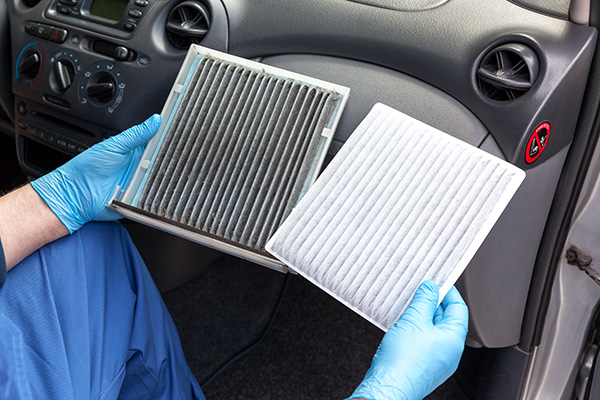
When it comes to vehicle maintenance, the cabin air filter is often overlooked. Yet this small component plays a big role in keeping the air inside your vehicle clean and breathable. Over time, it traps dust, pollen, exhaust fumes, and other airborne pollutants that would otherwise enter the cabin through the HVAC system.
Replacing the cabin air filter on schedule helps protect your respiratory health, ensures your vehicle’s climate control system operates efficiently, and contributes to a more pleasant driving experience. Let’s explore when and why this service is necessary.
What Is the Cabin Air Filter
Unlike the engine air filter, which protects the engine from debris, the cabin air filter is designed to protect passengers from outside contaminants. It’s usually located behind the glove box, under the dashboard, or beneath the hood, depending on the make and model.
As outside air is drawn into the vehicle, the cabin filter captures:
- Dust and dirt
- Pollen and mold spores
- Soot and smoke
- Exhaust gases and industrial pollution
This filtration is especially beneficial for drivers with allergies, asthma, or other respiratory sensitivities.
How Often Should It Be Replaced
Most manufacturers recommend replacing the cabin air filter every 15,000 to 30,000 miles, but the ideal interval depends on your specific vehicle and driving environment.
If you frequently drive in urban areas with heavy traffic, near construction zones, or on dirt roads, your filter may clog up faster and require more frequent replacement. The same goes for vehicles in regions with a lot of pollen or wildfire smoke.
As a general guideline:
- Every 15,000 miles if you drive in dusty, high-traffic, or heavily polluted areas.
- Every 20,000 to 30,000 miles for regular use in mild conditions.
- Annually if mileage is low but the vehicle is exposed to seasonal allergens or smog.
Consult your owner’s manual or ask our technicians for a schedule tailored to your vehicle and climate.
Signs Your Cabin Air Filter Needs Replacing
If you’re unsure when your cabin filter was last changed, your vehicle may start to show some telltale signs. Common indicators include:
- A musty or unpleasant odor coming from the vents
- Reduced airflow from the HVAC system, even on high settings
- Increased noise from the fan when the A/C or heater is on
- Foggy windows that are slow to clear
- A dusty or stuffy feeling in the cabin
In some cases, you may also notice an increase in allergy symptoms while driving. A clogged cabin filter won’t effectively trap allergens, making it harder to breathe clean air inside your vehicle.
What Happens if You Don’t Replace It
A dirty or clogged cabin air filter won’t just reduce air quality—it can also affect your vehicle’s climate control performance.
As the filter becomes saturated with debris, it restricts airflow through the ventilation system. This forces the blower motor to work harder, which can lead to premature wear or overheating. In extreme cases, it could result in HVAC system failure.
An overworked air conditioning system may take longer to cool your cabin, reduce fuel efficiency, and leave windows foggy for extended periods during humid or cold weather.
DIY or Professional Replacement
Some cabin air filters are easy to access and replace yourself, especially if they’re located behind the glove box. However, on many vehicles, access requires removing panels or working in tight spaces, making it a job better left to professionals.
During a routine maintenance visit, a technician can quickly inspect the filter, determine if it needs replacement, and install a new one that matches your vehicle’s specifications. This ensures the job is done right and that the filter seals properly for maximum effectiveness.
Breathe Cleaner Air With Help From DRIVE AutoCare in Solana Beach, CA
At DRIVE AutoCare, with one convenient location in Solana Beach, CA, we believe that clean air is just as important as clean oil. Our technicians can inspect and replace your cabin air filter as part of a scheduled maintenance service, helping you and your passengers breathe easier on every drive.
Whether you’ve noticed weak airflow or simply want fresher cabin air, schedule a visit with DRIVE AutoCare today. We'll help you stay comfortable and protect your HVAC system, mile after mile.